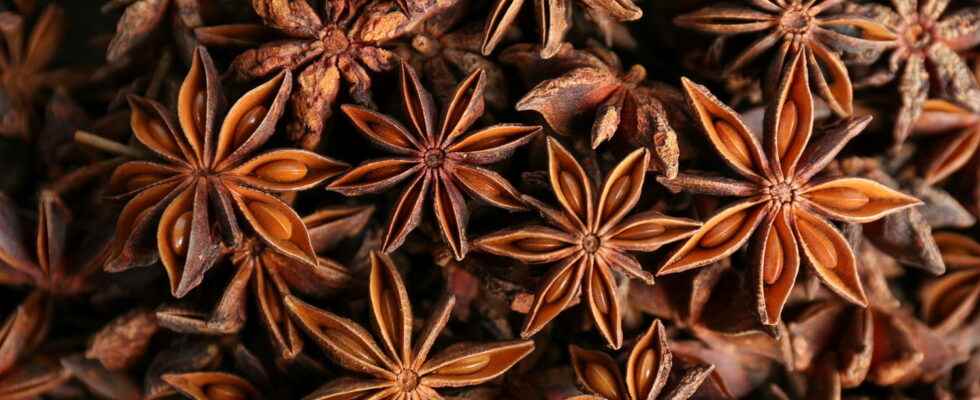Star anise, or star anise, has many health benefits, especially for the digestive tract. How to use it ? Infusion? What are the benefits and contraindications? The lighting of Nathalie Faggianelli, phyto-aromatologist.
From natural remedies to have at home: star anise ! On sale in organic shop or in pharmacies, it is easily used in tisane to facilitate the digestion for example. Manual.
Definition: what is star anise?
Chinese star anise or star anise (illicium verum in Latin) is a small fruit from the star anise, native to southern China. It owes its name to its characteristic shape eight-pointed star. It can be found in herbalists, pharmacies or organic stores. It can be used in infusion (seeds) or in decoction (whole fruits) tos digestive virtues, but it is also appreciated in cooking for its aniseed taste, it is found in particular in spice mixes, in curries, mulled wine spices. It is very similar in properties to green anise but is more aromatic and fragrant. “It is important to do the distinction between star anise from China and star anise from Japan, which is toxic and prohibited in France. Cases of food poisoning have, in fact, been reported with the latter a few years ago (convulsions, digestive disorders)“, nuance Nathalie Faggianelli, phyto-aromatologist.
What are the benefits of star anise?
Star anise is mainly famous for its digestive virtues. With properties antispasmodicsit is recommended in case of difficult digestionespecially in people withdyspepsia, bloating and slow digestion. It is very effective after a meal that is a little too heavy. “Star anise is a so-called carminative plant, which means that it will help to better digest and expel gases. It can also be used in case of wet cough, when there is a lot of mucus and hypersecretions contained in the respiratory tract because it has a thinning and expectorant action. Star anise also has hormonal properties and is galactagogue (it stimulates lactation in breastfeeding women) but should not be used for this purpose in pregnant and breastfeeding women because it contains toxic compounds for the baby” develops the phyto-aromatologist. In cosmetic care, star anise can be used for its purifying and antioxidant propertiesit would contribute to remove dead cells and slow down skin aging. In practice, star anise powder can be added to all home care products such as masks, gels, creams and lotions. “There is no official claim or reported use for this, it is not recommended to make abrasive scrubs that attack the skin because we would enter the vicious circle of pimples“, rectifies the specialist.
Star anise should never be used for inhalation in case of respiratory infection
Star anise can be used in the form of a decoction : 3 to 6 dried stars are immersed in boiling water, then left to infuse for 10 minutes. “We can consume up to 3 cups a day, ideally after meals to aid digestion“, advises Nathalie Faggianelli. It is rarely used alone and you may prefer to mix it with bitter orange bark, lemon balm (leaf) and a little cinnamon. On the other hand, contrary to popular beliefstar anise should never be used for inhalations in case of respiratory infection. “It is too toxic a plant and it is very risky to use it like this! We do not heat an essential oil and I never recommend this use in a bowl of water where the HE do not mix and come directly attack the respiratory tract“, warns the phyto-aromatologist.
What are the dangers of star anise?
In high doses, star anise, and especially its neurotoxic essential oil, can cause seizures, as well as digestive upset if ingested. This is why it is not available over the counter and cannot be delivered only on medical prescription. “However, in decoction-infusion of fruit-seeds, these undesirable effects can only occur in the event of prolonged intake and non-compliance with the dosage.“, reassures Nathalie Faggianelli.
What are the contraindications of star anise?
Star anise is rich in anethole, a neurotoxic compound that can be harmful to the development of fetus and promote the occurrence of a skin allergy. It is therefore formallyt contraindicated in pregnant or breastfeeding women and in case of hormone-dependent cancer. It should not be used in babies and children without medical advice. “In addition, star anise is not recommended for people under anticoagulant treatment because it can increase their effect. Finally, it is contraindicated in case of hemochromatosis, a genetic disease that is characterized by iron overload, because star anise increases iron absorption“details our interlocutor.
thanks to Nathalie Faggianelliphyto-aromatologist .
